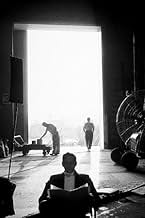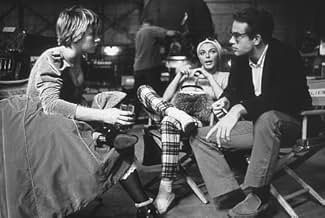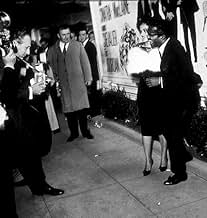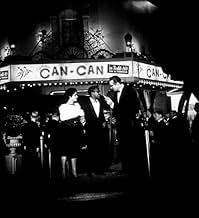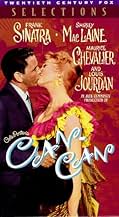Can-Can
- 1960
- Tous publics
- 2h 11min
NOTE IMDb
6,3/10
2,6 k
MA NOTE
Ajouter une intrigue dans votre langueIn 1896 Paris, a female nightclub proprietor fights against the forces of public morality for the right to feature her performers doing the risqué dance, the Can-Can.In 1896 Paris, a female nightclub proprietor fights against the forces of public morality for the right to feature her performers doing the risqué dance, the Can-Can.In 1896 Paris, a female nightclub proprietor fights against the forces of public morality for the right to feature her performers doing the risqué dance, the Can-Can.
- Réalisation
- Scénario
- Casting principal
- Nommé pour 2 Oscars
- 5 victoires et 7 nominations au total
Frank Baker
- Party Guest
- (non crédité)
Benjie Bancroft
- Club Patron
- (non crédité)
Herman Belmonte
- Waiter
- (non crédité)
Shirley Blackwell
- Townsfolk
- (non crédité)
Eugene Borden
- Police Officer Chevrolet
- (non crédité)
Buddy Bryan
- Dancer
- (non crédité)
Carole Bryan
- Gigi
- (non crédité)
Avis à la une
Another Cole Porter Broadway show makes it Hollywood, but not intact. Can Can retained most of its score, but 20th Century Fox added some other Porter standards like Let's Do It. Just One of Those Things, You Do Something To Me. And of course the book was sanitized by the Hollywood censors.
Briefly the plot is a girl who's a Can Can dancer played by Shirley MacLaine has to choose between two men of the legal profession. Upright judge, Louis Jourdan and less than scrupulous attorney, Frank Sinatra. Maurice Chevalier is an older judge who knows all of them and presides over the film like an avuncular grandfather.
The performers all do justice to the Cole Porter score and the best musical moment is Frank Sinatra's singing of It's All Right With Me. He's singing it to Juliet Prowse who was his main squeeze at the time. It's one of Sinatra's best musical moments on film, a perfect mating of singer and song.
I'm sure glad neither Sinatra or MacLaine attempted any kind of phony French accent. Sinatra tried a Spanish one in The Pride and the Passion and the results were hilarious.
Shirley MacLaine before she came to Hollywood was in the chorus of Can-Can on Broadway so she was a perfect fit for her part as Simone Pistache the cabaret owner where the illegal Can-Can is performed.
For reasons I don't understand a duet with Frank Sinatra and Maurice Chevalier singing I Love Paris was cut, though it remained in the original cast album. Blockheads at Fox, what were they thinking?
It also would have been nice to have some Paris location shooting for this film, it was all done at 20th Century's backlot where Nikita Khruschev paid a historic visit and said this was an example of western immorality and decadence. You couldn't buy that kind of publicity.
Verdict on this film, well as Old Blue Eyes sang:
RING-A-DING DING DING, C'est Magnifique.
Briefly the plot is a girl who's a Can Can dancer played by Shirley MacLaine has to choose between two men of the legal profession. Upright judge, Louis Jourdan and less than scrupulous attorney, Frank Sinatra. Maurice Chevalier is an older judge who knows all of them and presides over the film like an avuncular grandfather.
The performers all do justice to the Cole Porter score and the best musical moment is Frank Sinatra's singing of It's All Right With Me. He's singing it to Juliet Prowse who was his main squeeze at the time. It's one of Sinatra's best musical moments on film, a perfect mating of singer and song.
I'm sure glad neither Sinatra or MacLaine attempted any kind of phony French accent. Sinatra tried a Spanish one in The Pride and the Passion and the results were hilarious.
Shirley MacLaine before she came to Hollywood was in the chorus of Can-Can on Broadway so she was a perfect fit for her part as Simone Pistache the cabaret owner where the illegal Can-Can is performed.
For reasons I don't understand a duet with Frank Sinatra and Maurice Chevalier singing I Love Paris was cut, though it remained in the original cast album. Blockheads at Fox, what were they thinking?
It also would have been nice to have some Paris location shooting for this film, it was all done at 20th Century's backlot where Nikita Khruschev paid a historic visit and said this was an example of western immorality and decadence. You couldn't buy that kind of publicity.
Verdict on this film, well as Old Blue Eyes sang:
RING-A-DING DING DING, C'est Magnifique.
Well, Can-Can is not a total loss, but it's not a 10-star gem of a movie either, but - it IS entertaining, but the biggest problem that I see with the film is that everyone looks like they're embarrassed to be in the movie with each other because no one is actually looking at each other when they're saying their lines. Look at the scene where Shirley McClain is making up the story as to how Louis Jourdan was trying to overcome her sexually and the scene goes something like this:
SHIRLEY: And I fought him and fought him and stuggled, but what could a person do? MAURICE: [embarrassed to say] Uh - submit - of course! SHIRLEY: [slightly glances at thim and them says loudly] SUBMIT?
The film just kinda lays there and doesn't do anything. Come on - it's not Gigi! It was really a re-uniting of Louie and Maurice because of their hit movie Gigi and that's about where the uniting ends, but there are some highlights to the film. Shirley McClaine's apache dance with the guys while Louis Jourdan looks on is a great number, and the Adam and Eve Ballet is quite good and Shirley's line before the ballet is wonderful when she says something like this: "Be it known that sin may have been invented in the Garden of Eden, but it was perfected in Monemart!"
It just seems like all they're doing in the film is walking through their dress rehearsal without putting any oomph into the acting, and at the same time the some of the costumes are so tacky that they look like we did as kids when we played dress-up as adults! And, look at the scene before Maurice and Louis sing "Live and Let Live". It looks like it was inserted on purpose so that they could have the opportunity to sing the song, and the scene in which Maurice sings "It Was Just One of Those Things". Even that looks like it was inserted on purpose just to give him a chance to sing a song, but the songs are great even though most of them were never in the original broadway play such as "You Do Something To Me", "Let's Do It", and "It Was Just One of Those Things", "It's Alright With Me" [which is slow and a very boring rendition], and oddly enough "I Love Paris" a duet between Frank Sinatra and Maurice Chevalier was deleted from the movie and only heard in the the original soundtrack album, and the Oveture and beginning Credits of the video, that is if you have the first video version of Can-Can in which you get the Oveture, Intermission Music, and Exit Music with all the musical numbers letter-boxed, and why they deleted "I Love Paris" from the movie is beyond me since it was the hit of the show. Again, Hollywood has been known to do some dumb stuff!
Juliet Prowse's big number "Maids From France" is quite good, but it's obvious why she's in the scene with Frank Sinatra when he sings "It's Alright With Me" because at that time they were having an affair, and I guess if it was alright with them it should be alright with us, but later he would marry Mia Farrow and since Frank was Italian it was only obvious that his kids would call her "Uh-Mama Mia"!
Anyway, I sure wish they would re-release the original video version of "Can-Can" or a whole widescreen version on D.V.D.. Other songs from the Broadway Show were deleted from the movie such as "Never Give Anything Away" "Al-e-Vou-Zon" [which is only used in Shirley McClains apache dance as a melody] "There Is No Trick To A Can Can" which is just used as a melody for the Can-Can at the end of the movie, and again even though they deleted a singing version of the hit of the play "I Love Paris", at least they use the melody of it in the Adam and Eve Ballet, but Shirley McClains drunken version of "Come Along With Me" is delightful, and here goes the insanity of Hollywood again, at the end of the film when the Paddy-Wagon is pulling away with Shirley and Frank in it - the chorus is singing the last lines of "I Love Paris"!
So - why didn't Louis get Shirley in the end? Well, it's obvious that she was in love with Frank Sinatra all the time, but more than that; "Once a Rat Packer; always a Rat Packer"!
SHIRLEY: And I fought him and fought him and stuggled, but what could a person do? MAURICE: [embarrassed to say] Uh - submit - of course! SHIRLEY: [slightly glances at thim and them says loudly] SUBMIT?
The film just kinda lays there and doesn't do anything. Come on - it's not Gigi! It was really a re-uniting of Louie and Maurice because of their hit movie Gigi and that's about where the uniting ends, but there are some highlights to the film. Shirley McClaine's apache dance with the guys while Louis Jourdan looks on is a great number, and the Adam and Eve Ballet is quite good and Shirley's line before the ballet is wonderful when she says something like this: "Be it known that sin may have been invented in the Garden of Eden, but it was perfected in Monemart!"
It just seems like all they're doing in the film is walking through their dress rehearsal without putting any oomph into the acting, and at the same time the some of the costumes are so tacky that they look like we did as kids when we played dress-up as adults! And, look at the scene before Maurice and Louis sing "Live and Let Live". It looks like it was inserted on purpose so that they could have the opportunity to sing the song, and the scene in which Maurice sings "It Was Just One of Those Things". Even that looks like it was inserted on purpose just to give him a chance to sing a song, but the songs are great even though most of them were never in the original broadway play such as "You Do Something To Me", "Let's Do It", and "It Was Just One of Those Things", "It's Alright With Me" [which is slow and a very boring rendition], and oddly enough "I Love Paris" a duet between Frank Sinatra and Maurice Chevalier was deleted from the movie and only heard in the the original soundtrack album, and the Oveture and beginning Credits of the video, that is if you have the first video version of Can-Can in which you get the Oveture, Intermission Music, and Exit Music with all the musical numbers letter-boxed, and why they deleted "I Love Paris" from the movie is beyond me since it was the hit of the show. Again, Hollywood has been known to do some dumb stuff!
Juliet Prowse's big number "Maids From France" is quite good, but it's obvious why she's in the scene with Frank Sinatra when he sings "It's Alright With Me" because at that time they were having an affair, and I guess if it was alright with them it should be alright with us, but later he would marry Mia Farrow and since Frank was Italian it was only obvious that his kids would call her "Uh-Mama Mia"!
Anyway, I sure wish they would re-release the original video version of "Can-Can" or a whole widescreen version on D.V.D.. Other songs from the Broadway Show were deleted from the movie such as "Never Give Anything Away" "Al-e-Vou-Zon" [which is only used in Shirley McClains apache dance as a melody] "There Is No Trick To A Can Can" which is just used as a melody for the Can-Can at the end of the movie, and again even though they deleted a singing version of the hit of the play "I Love Paris", at least they use the melody of it in the Adam and Eve Ballet, but Shirley McClains drunken version of "Come Along With Me" is delightful, and here goes the insanity of Hollywood again, at the end of the film when the Paddy-Wagon is pulling away with Shirley and Frank in it - the chorus is singing the last lines of "I Love Paris"!
So - why didn't Louis get Shirley in the end? Well, it's obvious that she was in love with Frank Sinatra all the time, but more than that; "Once a Rat Packer; always a Rat Packer"!
What does an old musical set in France need? Maurice Chevalier and Louis Jourdan, of course! And since there's also singing and a cute dancer who likes showing off her legs, what else does it need? Frank Sinatra and Shirley MacLaine! Can-Can has Shirley, both French charmers, and Ol' Blue Eyes.
Set in the 1800s, when the can-can dance was forbidden in France because it was too risqué, Shirley MacLaine decides to buck the system and allows her and her nightclub dancers show off their legs. Lots of dancing from choreographer Hermes Pan, lots of pretty costumes, lots of Cole Porter songs, and a love triangle that will keep you on the edge of your seat the entire time, Can-Can is definitely one to see if you like old musicals. I've seen them all, and while this one doesn't make it to the top shelf in my collection, I'm glad I saw it. Many famous songs come from this movie, including "I Love Paris", "Let's Do It", "Just One of Those Things", and "It's All Right With Me", so if you like any of those, rent it during your next musical-fest weekend.
Set in the 1800s, when the can-can dance was forbidden in France because it was too risqué, Shirley MacLaine decides to buck the system and allows her and her nightclub dancers show off their legs. Lots of dancing from choreographer Hermes Pan, lots of pretty costumes, lots of Cole Porter songs, and a love triangle that will keep you on the edge of your seat the entire time, Can-Can is definitely one to see if you like old musicals. I've seen them all, and while this one doesn't make it to the top shelf in my collection, I'm glad I saw it. Many famous songs come from this movie, including "I Love Paris", "Let's Do It", "Just One of Those Things", and "It's All Right With Me", so if you like any of those, rent it during your next musical-fest weekend.
Strangely enough, the weakest aspect of this musical is the quality of the songs. Most of them are fairly mediocre, and fail to stay in the memory for long. But otherwise, "Can-Can" is a smashing entertainment. Lavishly produced and gorgeously photographed, this is one expensive movie where the money were spent with care and taste (unlike, for example, "Gentlemen Prefer Blondes" which, despite its big budget, looked cheap). The story may be a little thin, but it's suspenseful, too: you can never predict with absolute certainty if MacLaine will choose Sinatra (who is wonderful) or Louis Jourdan (who is as sly and charming as he was when he played the villain in "Octopussy"). But above everything else, this movie is a feast for the eyes!
This is another film which was often shown on TV (twice on the local channel alone!) but I hadn’t bothered with until now; it’s recently been released as a 2-Disc Set by Fox but, in view of its middling reputation, opted to acquire the film by itself.
To begin with, the DVD presentation had its good and bad points: the film was made available in its “Roadshow Version” – running 142 minutes against the “General Release Version” which eliminated 11 minutes of extraneous music (Overture, Intermission, Entr’ Acte and Exit Music); unfortunately, time seems to have taken its toll on the negative as there were several instances of color fluctuation throughout! As can be surmised, I decided to give the film a whirl as part of my ongoing marathon to commemorate the 10th anniversary from the passing of its male lead – Frank Sinatra; curiously enough, given his reputation as one of the foremost American singers, he appeared in few vintage musicals over the years…and it’s certainly a tribute to his acting talent that his non-musical work (often in hard-hitting, even groundbreaking films) has tended to overshadow this more familiar aspect of his personality – at least on the silver screen!
Anyway, to get back to the film proper: I found it quite engaging and its considerable length not overly taxing – and this, to a large degree, is thanks to the formidable star cast (which, apart from Sinatra, included Shirley MacLaine, Maurice Chevalier and Louis Jourdan). The first two had already appeared together – albeit in dramatic roles – in SOME CAME RUNNING (1958), while the others had been wonderfully teamed in the same genre and a similar ambiance in GIGI (1958). Ironically, both these films were helmed by a master stylist – Vincente Minnelli…so, perhaps, Fox should have struck a deal with MGM to acquire his services for CAN-CAN – but, given director Lang’s previous musical success with THE KING AND I (1956), they obviously thought he could do no wrong. The fact is that his handling is sterile and more accommodating to the Widescreen ratio than the necessities of the plot and characters – filming events from a distance and rarely cutting or even moving the camera; this lazy approach (which still landed him a nomination from the Directors' Guild Of America!) is doubly frustrating when viewed on a small screen!!
Apparently, the production went through a lot of script changes (Sinatra’s role, reportedly, wasn’t even in the stage original to begin with!), songs were dropped and replaced by other Cole Porter standards which don’t really fit in (such as Jourdan’s “You Do Something To Me”); the rest of the soundtrack isn’t particularly outstanding (unlike that of GIGI, for instance) but a number of tunes are cleverly reprised (sometimes with variations and by different characters) during the course of the film. It was nice, too, seeing two world-renowned singers with such different styles as Sinatra and Chevalier come together (and having fun with it); Chevalier and Jourdan’s roles, then, are virtual carbon copies of their GIGI characterizations – but it’s a formula that seems to work (even if it’s not as central to the main plot this time around, Jourdan having been relegated to The Other Man type).
MacLaine did few musicals as well but her vivaciousness (as a dancer and owner of an establishment which finds itself frequently in trouble with the law over the forbidden “Can-Can” dance, but who manages to charm the stuffy judge at the trial) ensures that her numbers emerge as the show’s highlights: the Apache Dance, the drunken recital of a vulgar song at her engagement party to Jourdan (at the instigation of lawyer Sinatra, who loves her but is unwilling to commit himself) and the “Garden Of Eden” sequence (intended to demonstrate that “Sin wasn’t invented in Montmartre – it was only perfected there”!). Two other important figures (though both severely underwritten) are those played by Juliet Prowse and Frenchman Marcel Dalio as the nervous but devoted manager of the “Bal De Paradis” (the latter was a versatile actor in his native land, but he was stuck with this kind of unrewarding role during his long tenure in Hollywood!); the former appears as a leading dancer at the club and MacLaine’s prospective rival – interestingly, the two actresses’ physiognomies are strikingly similar – for Sinatra’s attentions (a situation which is indirectly played upon during the afore-mentioned “Garden Of Eden” number, apart from which they’re teamed for the climactic Can-Can performance…to the predictable enthusiasm of the formerly disapproving head of a female Legion Of Decency-type group).
In the end, while this film can’t be considered a classic musical as such, it still seems to me to have been unfairly maligned – as some fantastic talent has been assembled in the service of a charming (albeit unsurprising) narrative to provide colorful (if uninspired) entertainment which the genre was capable of during its studio-system heyday…
To begin with, the DVD presentation had its good and bad points: the film was made available in its “Roadshow Version” – running 142 minutes against the “General Release Version” which eliminated 11 minutes of extraneous music (Overture, Intermission, Entr’ Acte and Exit Music); unfortunately, time seems to have taken its toll on the negative as there were several instances of color fluctuation throughout! As can be surmised, I decided to give the film a whirl as part of my ongoing marathon to commemorate the 10th anniversary from the passing of its male lead – Frank Sinatra; curiously enough, given his reputation as one of the foremost American singers, he appeared in few vintage musicals over the years…and it’s certainly a tribute to his acting talent that his non-musical work (often in hard-hitting, even groundbreaking films) has tended to overshadow this more familiar aspect of his personality – at least on the silver screen!
Anyway, to get back to the film proper: I found it quite engaging and its considerable length not overly taxing – and this, to a large degree, is thanks to the formidable star cast (which, apart from Sinatra, included Shirley MacLaine, Maurice Chevalier and Louis Jourdan). The first two had already appeared together – albeit in dramatic roles – in SOME CAME RUNNING (1958), while the others had been wonderfully teamed in the same genre and a similar ambiance in GIGI (1958). Ironically, both these films were helmed by a master stylist – Vincente Minnelli…so, perhaps, Fox should have struck a deal with MGM to acquire his services for CAN-CAN – but, given director Lang’s previous musical success with THE KING AND I (1956), they obviously thought he could do no wrong. The fact is that his handling is sterile and more accommodating to the Widescreen ratio than the necessities of the plot and characters – filming events from a distance and rarely cutting or even moving the camera; this lazy approach (which still landed him a nomination from the Directors' Guild Of America!) is doubly frustrating when viewed on a small screen!!
Apparently, the production went through a lot of script changes (Sinatra’s role, reportedly, wasn’t even in the stage original to begin with!), songs were dropped and replaced by other Cole Porter standards which don’t really fit in (such as Jourdan’s “You Do Something To Me”); the rest of the soundtrack isn’t particularly outstanding (unlike that of GIGI, for instance) but a number of tunes are cleverly reprised (sometimes with variations and by different characters) during the course of the film. It was nice, too, seeing two world-renowned singers with such different styles as Sinatra and Chevalier come together (and having fun with it); Chevalier and Jourdan’s roles, then, are virtual carbon copies of their GIGI characterizations – but it’s a formula that seems to work (even if it’s not as central to the main plot this time around, Jourdan having been relegated to The Other Man type).
MacLaine did few musicals as well but her vivaciousness (as a dancer and owner of an establishment which finds itself frequently in trouble with the law over the forbidden “Can-Can” dance, but who manages to charm the stuffy judge at the trial) ensures that her numbers emerge as the show’s highlights: the Apache Dance, the drunken recital of a vulgar song at her engagement party to Jourdan (at the instigation of lawyer Sinatra, who loves her but is unwilling to commit himself) and the “Garden Of Eden” sequence (intended to demonstrate that “Sin wasn’t invented in Montmartre – it was only perfected there”!). Two other important figures (though both severely underwritten) are those played by Juliet Prowse and Frenchman Marcel Dalio as the nervous but devoted manager of the “Bal De Paradis” (the latter was a versatile actor in his native land, but he was stuck with this kind of unrewarding role during his long tenure in Hollywood!); the former appears as a leading dancer at the club and MacLaine’s prospective rival – interestingly, the two actresses’ physiognomies are strikingly similar – for Sinatra’s attentions (a situation which is indirectly played upon during the afore-mentioned “Garden Of Eden” number, apart from which they’re teamed for the climactic Can-Can performance…to the predictable enthusiasm of the formerly disapproving head of a female Legion Of Decency-type group).
In the end, while this film can’t be considered a classic musical as such, it still seems to me to have been unfairly maligned – as some fantastic talent has been assembled in the service of a charming (albeit unsurprising) narrative to provide colorful (if uninspired) entertainment which the genre was capable of during its studio-system heyday…
Le saviez-vous
- AnecdotesIt is explained in the film that the can-can was considered a lewd and lascivious dance (in reality often performed without panties).
- GaffesAbout 34 minutes in, when Philipe tries to close the window in Simone's boudoir, the whole wall shakes as he struggles with the window, indicating that it is a set wall and not a real building.
- Citations
François Durnais: You look like a broken umbrella.
- Crédits fousOpening credits prologue: Montmartre-1896
- ConnexionsFeatured in 20th Century-Fox: The First 50 Years (1997)
- Bandes originalesI Love Paris
(uncredited)
Music by Cole Porter
Lyrics by Cole Porter
Sung by chorus over the beginning and end credits
Meilleurs choix
Connectez-vous pour évaluer et suivre la liste de favoris afin de recevoir des recommandations personnalisées
- How long is Can-Can?Alimenté par Alexa
Détails
- Date de sortie
- Pays d’origine
- Site officiel
- Langues
- Aussi connu sous le nom de
- Jack Cummings' Production of Cole Porter's Can-Can
- Lieux de tournage
- Paris, France(stock footage of the evening barge sequences)
- Société de production
- Voir plus de crédits d'entreprise sur IMDbPro
Box-office
- Budget
- 6 000 000 $US (estimé)
- Durée2 heures 11 minutes
- Rapport de forme
- 2.20 : 1
Contribuer à cette page
Suggérer une modification ou ajouter du contenu manquant





